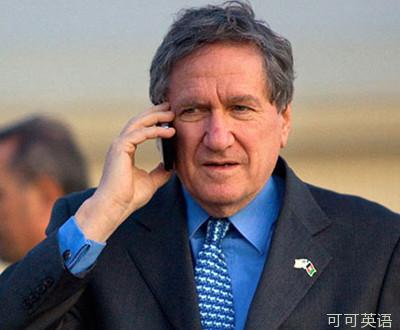Obituary;Richard Holbrooke;
讣告;理查德·霍尔布鲁克;
Richard Holbrooke, diplomat and troubleshooter, died on December 13th, aged 69.
外交家和纠纷调解专家理查德·霍尔布鲁克,于12月13日去世,享年69岁。
HIS favourite book was Herman Melville's “Moby-Dick”, and it was pretty clear why. He cited Ishmael's confession near the beginning of his memoir of the 1995 Bosnian peace talks, “To End a War”: “as for me, I am tormented with an everlasting itch for things remote. I love to sail forbidden seas, and land on barbarous coasts.” For Richard Holbrooke the remote, the forbidden and the barbarous were as likely to be found at negotiating tables, in cold hotel rooms, or in windowless government offices where men and women struggled to sort out the world, while he banged heads.

他最喜爱的书是赫尔曼·梅尔维尔的《白鲸记》,而且原因也非常明了。他在关于1995年波斯尼亚和谈的回忆录的开头就引用了伊希梅尔的自白,“结束战争”:“对我来说,我对遥远的事物有一种不断的渴望,这一直使我备受折磨。我喜欢在禁海上航行,喜欢踏上原始海岸。”对理查德·霍尔布鲁克而言,这种遥远,禁止和原始很有可能在谈判桌上,在冰冷的宾馆房间里,或者在没有窗户的政府办公室里找到,在这些地方人们都努力理清头绪,而他则猛敲脑袋。
He liked Matthew Arnold, too, and again recognised that “thirst to spend our fire and restless force/In tracking out our true, original course”. He tracked his own course through history, more than 40 years at the sharp edge of American foreign policy, working for every Democratic president since John Kennedy: a big, burly actor in his own play, glaring through wire-rimmed glasses or barking into his phone. A crowd of “close friends” eddied round him, all of whom could be nudged, flattered, tricked, and in the end—when the blue eyes hardened and the cheeks puffed out—pushed into doing what he wanted. A bastard, a bully, a bulldozer, an egoist, but also a charmer, full of heart and fun, a great guy to have dinner with, even when—as at Pamela Harriman's in Paris in August 1995—he would get up eight or nine times from the table to take telephone calls, radiating happy self-importance.
他也很喜欢马修·阿诺德,而且再次认识到“对运用我们激情和不安份力量的渴望;对我们内心真实和最初目标的追寻。”在美国外交政策方面工作了40多年,为自肯尼迪总统之后的历届民主党总统工作过,透过这些历史他追寻着自己的最初目标:在自己游戏中的一个高大,直率的演员,总是以他那镶有金属丝边的眼镜或者对着电话的大吼而引人注目。一群“密友”都围绕在他周围,但是当他硬下心肠,不讲面子的时候,他就会恭维,设计这些“密友”,甚至向他们动手,最后还能让他们按自己的要求做事。他就是一个混蛋,一个无赖,一个恶霸,一个以自我为中心的人,但是同时,他也是一个有魅力的人,极富爱心,充满幽默感,是在一起吃饭的合适人选,甚至1995在帕米拉·哈里曼巴黎的家里,他也会从桌边站起来8,9次去接电话,无时不刻不在显示着自己的重要。
Those calls were to organise NATO air strikes on the Bosnian Serb positions round Sarajevo. NATO was meant to operate as a collective; but in the face of the West's craven failure to end the Bosnian war, Mr Holbrooke had more or less singlehandedly decided to play hardball with the Serbs. If they would not make concessions at the table, they would have to be beaten on the ground. He made dramatic appeals to Washington to give him “bombs for peace”. The pleas succeeded.
那些电话是在组织北约对萨拉热窝周围波斯尼亚人和塞尔维亚人聚点的空袭。北约是整体行动的,但是面对韦斯特懦弱地试图结束波斯尼亚战争的不成功,霍尔布鲁克几乎就是单独决定对塞尔维亚人要强硬。如果在谈判桌上谈不拢,那么就必须给他们点颜色看看。他强烈地请求华盛顿同意他“用炸弹换和平”的方案,他做到了。
The Dayton peace accords, signed that December, sealed Mr Holbrooke's fame as a diplomat. Signs of his balance and realism were everywhere, for example his insistence that the new Bosnia, despite including a Serbian republic, should be a properly multi-ethnic state. Recalling first-hand the 1968 Vietnam peace talks in Paris, held up for two months over how to seat the Vietcong, he demanded a table that would seat nine people only, not including the Bosnian Serbs. The only Serb he would deal with was Slobodan Milosevic, a “thug” he tolerated because he could be a thug himself. It was surely not immoral to talk, walk in the woods, down a pear brandy or two together, if it saved lives. As it turned out, he saved many thousands.
那年12月份签署的代顿和平协议使作为外交官的霍尔布鲁克声名鹊起。他很现实也很会平衡各方利益,例如,他坚持新的波斯尼亚应该是一个多民族的国家,尽管已经有了塞尔维亚共和国。1968年在巴黎举行的越南和谈会议用了两个多月时间讨论怎样对待越共,一回想起这个,他就要求要举行一个不包括波斯尼亚人和塞尔维亚人的谈判会议。他唯一愿意打交道的塞尔维亚人是斯洛博丹·米洛舍维奇,他能够容忍这个“暴徒”是因为他自己本人也可能是一个暴徒。在树林里谈话,散步,喝下一两瓶梨白兰地酒,这些当然不是不道德的,如果这些能够拯救无数生命的话。结果证明,他确实拯救了很多人。
In Dayton and everywhere else he was a hard taskmaster, but this was no more than he demanded of himself: shuttling to and fro between continents, staying up sleepless to read a book or to watch “There's Something About Mary” for the fifth time. When he was given a job he did it fast, on his own terms (he was not Mr Obama's “envoy” to Afghanistan and Pakistan, too elegant a word, but his “special representative”, a much wider-ranging brief). And he expected short, direct lines of communication. As early as 1970, in a piece for the first issue of Foreign Policy (a magazine he edited from 1972 to 1977, during a Republican lull), he lamented the mushroom growth of the State Department, where internal communications were becoming “ever more time-consuming, less intelligible and less controllable”. He thus predicted four decades early the age of Wikileaks, though Wikileaks might well have doomed his tactics in Bosnia.
在代顿以及其他任何地方,他都是一名很难相处的领导,但是这仅仅是他对自己的要求:来回的在各大洲之间穿梭,熬夜不停地看一本书或者看第五遍我为玛丽狂。每接到一个工作,他都会很快完成,用他自己的话说(他不是奥巴马总统的阿富汗和巴基斯坦“特使”,这个词太文雅了,而是他的“特别代表”,这个词范围更广)。而且他喜欢简短直接的交流。早在1970年,外交政策(他1972年-1977年在共和党竞选期间编辑的一本杂志)第一期的一段中,他为国家部门的迅速增长感到悲哀,在这样的部门中,内部交流都变得“更浪费时间,更难理解,更难控制”。因此,他早在40年前就预言了维基泄密事件的发生,尽管维基泄密可能使他对波斯尼亚的战略趋于毁灭。
The impossible pursuit
不可能的追求
Kennedy's “ask what you can do for your country” had first got him into the foreign service, in the Mekong Delta in 1963, where he handed out cooking oil and thatching straw in a fruitless attempt to win the Vietnamese to America's side. Like the journalist he had meant to be, before the New York Times turned him down, he always tried to talk to locals. In Pakistan he would squeeze his big frame into refugees' tents in Swat, as relaxed as if he were cruising a Washington cocktail party, to listen to the misery of ordinary, frightened folk.
1963年在湄公河三角洲,他做了一些无用的尝试,向越南人分发食用油和盖房用的稻草,想以此来争取他们对美国的支持,这时,肯尼迪总统“你能为你的国家做些什么”这句话,让他义无返顾的步入了外交事业之中。他像一名记者一样—他本可以成为一名记者的,纽约时报拒绝了他—-总是试着和当地人交谈。在巴基斯坦,他会以庞大的身躯用力挤进难民营—就像华盛顿的鸡尾酒晚会上在散步一样放松—-来听取普通人和受惊平民的苦难。
To himself and to others he seemed a natural for secretary of state, but never made it; presidents' minds were set elsewhere. In the Obama foreign-policy cabal he sat awkwardly, a New Yorker rather than a Chicagoan, and a weary-seeming holdover from ancient Democratic regimes. His bluntness played badly in Kabul, where Hamid Karzai sometimes refused to talk or eat with him.
在自己和他人看来,他似乎是国务卿的最佳人选,但是他始终没有成功;不知道总统们是怎么想的。在奥巴玛的外交政策集团中他混的很艰难,他是纽约人而不是芝加哥人,他似乎是旧民主党体制中一个让人讨厌的,而又长期占据这个职位的老顽固。在喀布尔,他的直言不讳可一点也不吃香,哈米德·卡尔扎伊有时拒绝跟他交谈和吃饭。
He always insisted that Vietnam no longer haunted him, though the similarities with Afghanistan were inescapable, not least a crushing sense of the limits of American power. Mr Holbrooke, however, still believed that America was the world's problem-solver, and that with “all its will and all its strength” it could put the most benighted spots to rights. Even the Afghan war, perhaps, could be turned round. And so, like Ishmael, he charged boldly on:
他一直坚称越南不再是他关心的了,但是在阿富汗同样的情况中,他是逃不掉的,尤其是切实感觉到美国实力的限制。然而,霍尔布鲁克仍然相信美国是世界的问题解决者,以“其意愿和实力”,美国能解决最难解决的问题。甚至连阿富汗战争,可能也能挽回。因此,他像伊希梅尔一样大胆地指责:
and in the wild conceits that swayed me to my purpose, two and two there floated into my inmost soul, endless processions of the whale, and, mid most of them all, one grand hooded phantom, like a snow hill in the air.
在动摇我观点的疯狂的自以为是中,两只,两只,无数的鲸鱼漂进了我的灵魂最深处,在他们大多数中间都有一只带着面罩的大幽灵,就像空中的一座雪山。



